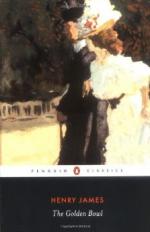gazer, in the still museum, before the named and dated
object, the pride of the catalogue, that time has polished
and consecrated. Extraordinary, in particular,
was the number of the different ways in which he thus
affected her as showing. He was strong—that
was the great thing. He was sure—sure
for himself, always, whatever his idea: the expression
of that in him had somehow never appeared more identical
with his proved taste for the rare and the true.
But what stood out beyond everything was that he was
always, marvellously, young—which couldn’t
but crown, at this juncture, his whole appeal to her
imagination. Before she knew it she was lifted
aloft by the consciousness that he was simply a great
and deep and high little man, and that to love him
with tenderness was not to be distinguished, a whit,
from loving him with pride. It came to her, all
strangely, as a sudden, an immense relief. The
sense that he wasn’t a failure, and could never
be, purged their predicament of every meanness—
made it as if they had really emerged, in their transmuted
union, to smile almost without pain. It was like
a new confidence, and after another instant she knew
even still better why. Wasn’t it because
now, also, on his side, he was thinking of her as his
daughter, was
trying her, during these mute seconds,
as the child of his blood? Oh then, if she wasn’t
with her little conscious passion, the child of any
weakness, what was she but strong enough too?
It swelled in her, fairly; it raised her higher, higher:
she wasn’t in that case a failure either—hadn’t
been, but the contrary; his strength was her strength,
her pride was his, and they were decent and competent
together. This was all in the answer she finally
made him.
“I believe in you more than any one.”
“Than any one at all?”
She hesitated, for all it might mean; but there was—oh
a thousand times!—no doubt of it.
“Than any one at all.” She kept nothing
of it back now, met his eyes over it, let him have
the whole of it; after which she went on: “And
that’s the way, I think, you believe in me.”
He looked at her a minute longer, but his tone at
last was right. “About the way—yes.”
“Well then—?” She spoke as for
the end and for other matters— for anything,
everything, else there might be. They would never
return to it.
“Well then—!” His hands came out,
and while her own took them he drew her to his breast
and held her. He held her hard and kept her long,
and she let herself go; but it was an embrace that,
august and almost stern, produced, for all its intimacy,
no revulsion and broke into no inconsequence of tears.
XXXVIII




